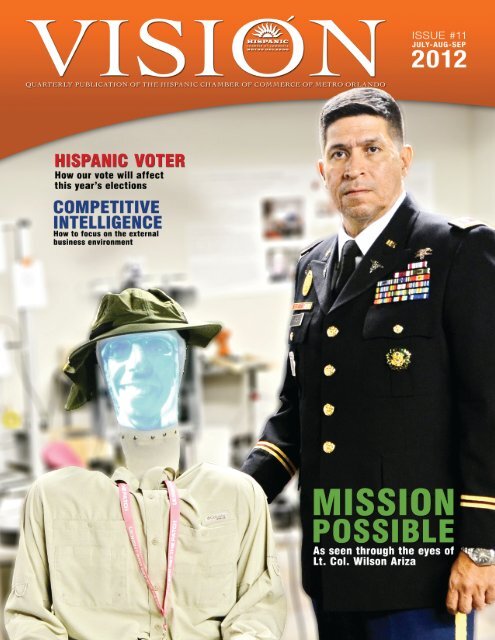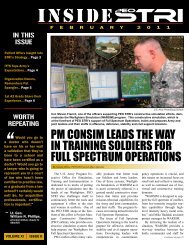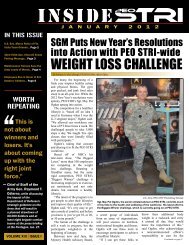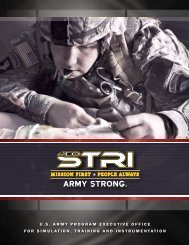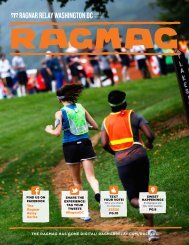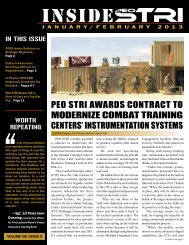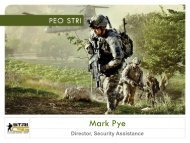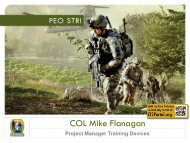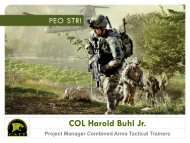Read more! - PEO STRI - U.S. Army
Read more! - PEO STRI - U.S. Army
Read more! - PEO STRI - U.S. Army
Create successful ePaper yourself
Turn your PDF publications into a flip-book with our unique Google optimized e-Paper software.
Hispanic Chamber of Commerce of Metro Orlando Visión | 1
COVER<br />
STORY<br />
10 | Visión Hispanic Chamber of Commerce of Metro Orlando<br />
MISSION<br />
POSSIBLE<br />
Pulling Together for a Better World<br />
by George Fournier<br />
IN<br />
places like Iraq, Afghanistan and Bosnia, he saw the horrors<br />
of war. In the faces of the military men and women who made<br />
personal sacrifices for peace, he saw a reason for hope. As<br />
seen through the eyes of Lieutenant Colonel Wilson Ariza,<br />
life is <strong>more</strong> than just an uncertain mix of good and bad. It is a bright<br />
opportunity to work with others for a better world.
“I liked computers and I was<br />
happy to be in the right place<br />
at the right time.”<br />
Hispanic Chamber of Commerce of Metro Orlando Visión | 11
When you first meet Wilson Ariza, you see a remarkable combination<br />
of military experience, medical training, and information technology<br />
savvy. With numerous deployments to war zones, he knows the<br />
experience of being under fire. With a love for healing (his mother<br />
was a nurse) he enlisted in the U.S. <strong>Army</strong> as a combat medic. With<br />
an ability to grasp the power of computers, he was instrumental in<br />
applying modern technology to the practice of medicine.<br />
On a deeper level, you also discover a humble man who is deeply<br />
committed to a vitally important mission. He wants to save lives.<br />
4:00 a.m. in the Morning<br />
We’ll start Wilson’s story on the campus<br />
of the University of Puerto Rico following<br />
his earlier enlistment as an <strong>Army</strong> combat<br />
medic. At the university, he was a fulltime<br />
student, had a full-time job, and got<br />
up at 4 a.m. to participate in ROTC. In<br />
a national competition, Wilson earned<br />
recognition as the top cadet in ROTC for<br />
Puerto Rico - an achievement that led<br />
to his commission in the <strong>Army</strong> Medical<br />
Service Corps.<br />
During the 1990s, the Medical Service<br />
Corps had a growing interest in<br />
information technology. As Wilson puts<br />
it, “I liked computers and I was happy<br />
to be in the right place at the right<br />
time.” In Fort Sam Houston in San<br />
Antonio, Texas, he led the team that<br />
started an IT career field for officers in<br />
the <strong>Army</strong> Medical Department.<br />
After this fast start, Wilson’s career<br />
continued to accelerate. Upon<br />
completing his Master’s degree in<br />
Health Services Administration and<br />
Information Management, he was<br />
deployed as Deputy Surgeon, Joint<br />
Guard in Bosnia. There he used<br />
his technology expertise to employ<br />
telemedicine technology in that<br />
troubled area for the first time.<br />
More Firsts<br />
Among the lessons learned from the first<br />
Gulf War was the need for battlefield<br />
access to the medical records of soldiers.<br />
After the war, President George H.W.<br />
Bush asked the U.S. Surgeon General<br />
to make it happen. At the time, Wilson<br />
was the Chief Information Officer at<br />
Darnall <strong>Army</strong> Community Hospital at<br />
Fort Hood in Texas. According to him,<br />
his superiors thought that he “was an<br />
IT person, had hospital administration<br />
experience, loved computers, and came<br />
from a school of medicine.” They figured<br />
Wilson was the right person to answer<br />
the President’s directive.<br />
The history-making project was called<br />
the Medical Communications for Combat<br />
Casualty Care program. The program<br />
acquisition cost was $750 million. The<br />
cost to Wilson was two-and-a half years<br />
of deployment during Operation Iraqi<br />
Freedom and Enduring Freedom. The<br />
payback was in knowing that he and his<br />
team were saving lives and providing<br />
the highest level of medical care.<br />
Sand on the Floor<br />
Today, Wilson is a resident of Central<br />
Florida and has the rather lengthy title<br />
of program manager for the U.S. <strong>Army</strong><br />
Medical Simulation Program at the<br />
Program Executive Office for Simulation,<br />
Training & Instrumentation (<strong>STRI</strong>). He<br />
is the first person to hold the title - a job<br />
that keeps him on the road three weeks<br />
out of four.<br />
Today, medical simulation has become<br />
the safest way to learn patient<br />
treatment procedures without practicing<br />
on live patients. Trainees work on<br />
“patient simulators,” which are highly<br />
sophisticated mannequins that can<br />
blink, breathe, cough and even bleed.<br />
Part of Wilson’s demanding job is to<br />
direct material development, acquisition,<br />
and support to the <strong>Army</strong>’s 23 worldwide<br />
Medical Simulation Training Centers<br />
(MSTC) which currently use patient<br />
simulation technology.<br />
To date, with the help of Wilson and<br />
his team, <strong>more</strong> than 400,000 service<br />
personnel have been trained to<br />
perform medical procedures under<br />
highly realistic conditions. If a combat<br />
medic needs to learn how to apply a<br />
tourniquet on a desert battlefield, a<br />
desert environment, complete with<br />
sand, is recreated at the MSTC facility.<br />
All the while, the simulated patient<br />
on the simulated battlefield manifests<br />
very real reactions to treatment. It is<br />
a dramatic advancement in medical<br />
training that, according to a September<br />
2009 assessment by the Defense Health<br />
Board, has saved an estimated 1000<br />
lives in Iraq and Afghanistan.<br />
The Epicenter for Medical<br />
Simulation - Central Florida<br />
Recently, the Veteran Health Administration<br />
began implementation of its<br />
Simulation Learning, Education and<br />
Resource Network in its <strong>more</strong> than 170<br />
medical centers around the country.<br />
Wilson was instrumental in coordinating<br />
the agreement between the VHA and the<br />
<strong>STRI</strong> here in Orlando. He now serves<br />
as the acquisition program manager for<br />
the network, helping to make Central<br />
Florida the epicenter for military medical<br />
simulation training.<br />
12 | Visión Hispanic Chamber of Commerce of Metro Orlando
The Network will be headquartered at the VHA’s newest medical center<br />
located in East Orlando in the Medical City complex at Lake Nona.<br />
Part of the new center is the Medical Simulation Center of Excellence<br />
that will serve as the baseline model for today’s most advanced<br />
medical simulation technology. As the <strong>Army</strong>’s Medical Liaison for<br />
Medical City, Wilson is again a pioneer for positive change. He notes,<br />
“Not only will people come to Orlando to go to the Disney parks, but also<br />
to learn the latest technologies in medical simulation.”<br />
La Familia Grande<br />
After 24 years in service to his country, Lt. Col. Ariza has a special affection<br />
for the <strong>Army</strong>, the people who mentored him, and the people with whom he<br />
worked. “We are a big family. We are in this business because we want<br />
a better world,” he says.<br />
Wilson’s sense of family and his core values were instilled by his<br />
parents. Later, they were shaped by his military service, and<br />
by interactions with diverse cultures around the world. His<br />
values have also been strengthened by his responsibilities as<br />
a husband and father of two girls.<br />
These experiences have helped Wilson recognize his<br />
responsibility to mentor and support others. Together with his<br />
wife, Nitza, he has started youth groups, and demonstrated to<br />
youngsters that hard work and having dreams are the foundations<br />
for success. Together, they have also helped immigrants of<br />
all nationalities with paperwork for citizenship or for starting<br />
a business. Also, as a member of the Hispanic Chamber of<br />
Commerce of Metro Orlando, Wilson has encouraged networking<br />
among fellow Hispanics, helping to generate opportunities for<br />
mutual support.<br />
A Pioneer’s Dream<br />
As a pioneer with a dream, Wilson still looks to the future. He<br />
is currently working on his doctorate at the University of Central<br />
Florida, combining a study of human factors and medical simulation.<br />
It is not possible to condense a career as big as Lt. Col. Ariza’s into<br />
a few short paragraphs. So we’ll let his words speak for themselves: “I want<br />
to see how we can all come together to contribute to a better nation and a better<br />
world, and to do that we all need to pull together.”<br />
Wilson and his “familia grande” have done just that.<br />
“ We are a big family.<br />
We are in this business<br />
because we want a<br />
better world ”<br />
Hispanic Chamber of Commerce of Metro Orlando Visión | 13


